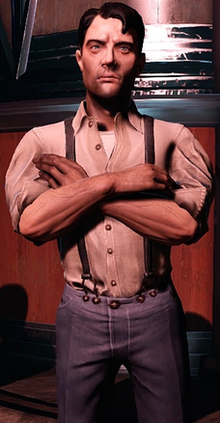| Atlas Frank Fontaine | |
|---|---|
| BioShock character | |
 Atlas as he appears in BioShock Infinite: Burial at Sea | |
| First appearance | BioShock (2007) |
| Created by | Ken Levine |
| Voiced by | Karl Hanover Greg Baldwin (development) |
Atlas is a character in the BioShock video game series created by Ken Levine, published by 2K Games. He first appears in the first title of the series, where he sets himself up as a benefactor of Jack, the game's player character, upon his arrival in the underwater city of Rapture. During a pivotal scene later in the game's narrative, Atlas discloses that he is actually the crime lord Frank Fontaine in disguise, the main antagonist of the game, and that he had been manipulating Jack to act against the city's founder Andrew Ryan. It is also revealed that he is responsible for orchestrating Jack's mental conditioning during his infancy and later a chain of events that led to his subsequent arrival in Rapture. Atlas/Fontaine also appears in the sequel BioShock 2 through audio diaries, and more prominently in BioShock Infinite: Burial at Sea, a prequel which sets up the events of BioShock.
The character's name is intended to be a direct reference to Ayn Rand's 1957 novel Atlas Shrugged as well as its namesake, the mythological Atlas. Atlas serves as a guiding voice who provides a motivating factor for players to progress the game's narrative, as well as a subversion of how video games address their audience and define player agency through his use of an innocuous phrase in his messages to Jack as a form of mind control. Karl Hanover voiced the character: he used fellow Irish actor Gabriel Byrne's character from Miller's Crossing as a template and spoke in his native Dublin accent as Atlas. He adopted a regional American accent for the character's lines as Fontaine.
The character's dual identities as Atlas and Fontaine has been subject to significant discussion and critical analysis within the context of BioShock's setting and themes. Some critics described his role to be an important element of the series' exploration of player agency. The character's role as the final boss of BioShock is less well received, with much of the criticism focusing on his visual design as well as structure of the associated gameplay mechanics.